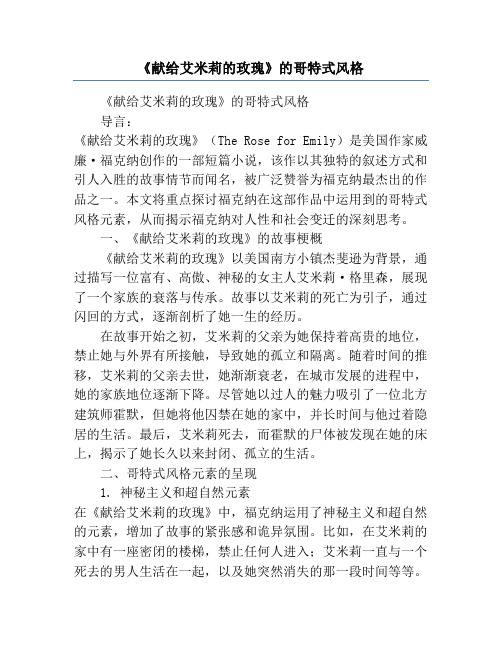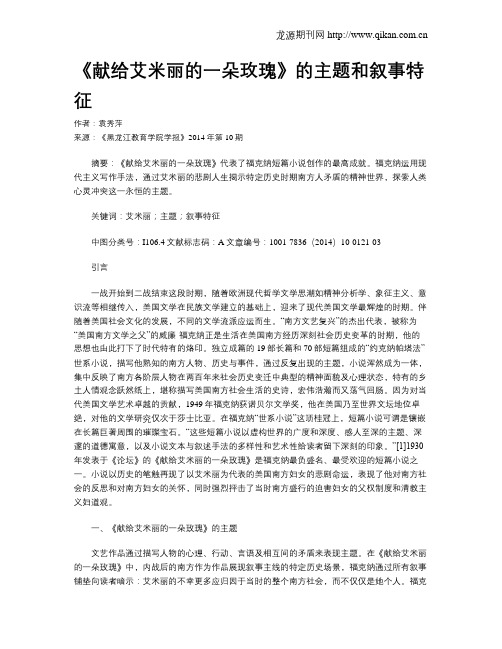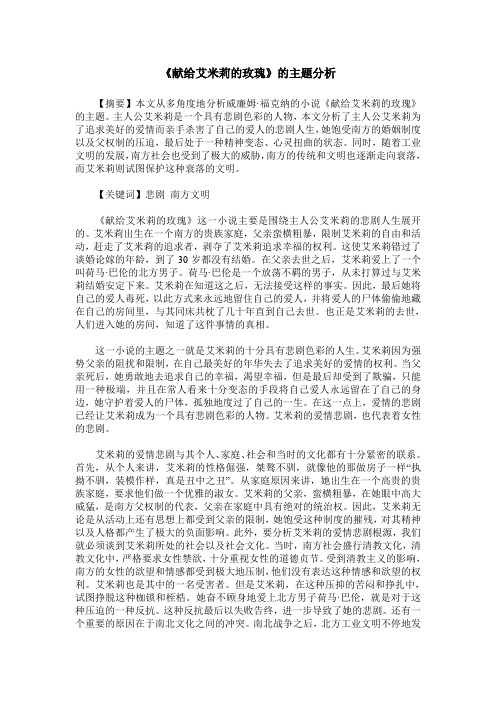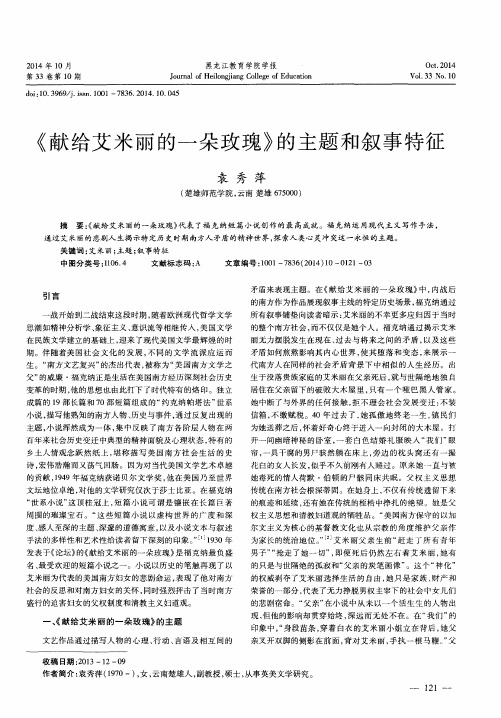献给艾米莉的玫瑰的主题
《献给艾米丽的一朵玫瑰花》|南方式的高贵败给了北方底层的爱情

《献给艾米丽的一朵玫瑰花》|南方式的高贵败给了北方底层的爱情前言:《献给艾米丽的一朵玫瑰花》是20世纪美国著名小说家威廉·福克纳于1930年4月发表的短篇小说,也是福克纳最具影响力的短篇小说之一。
作者福克纳善于描写美国南部的风土人情,被看作南方文学的代表人物。
1930年正值美国社会发展与改革时期,南方旧传统和北方现代文明碰撞下呈现出众多的社会矛盾,小说以此为背景从多维度揭示了特殊环境下的父女矛盾、社会等级矛盾、女性反抗与被压迫的矛盾等无法调和的社会问题。
《献给艾米丽的一朵玫瑰花》主要讲述的是美国南北战争后,生活在杰斐逊镇的格里尔森家族即艾米丽的父亲仍然保持着一贯的“南方做派”,为了维护所谓的等级和尊严,赶走了所有喜欢艾米丽的男子。
导致艾米丽在父亲去世后,不顾世俗的观念爱上了小镇修建铁路的工头北方佬荷默·伯隆,当她发现荷默无意与自己结婚时,为了留住爱情保、住名声用砒霜毒死了自己的爱人。
从此,艾米丽在破旧封闭的宅院里过着与世隔绝的生活,并与荷默的尸体同床共枕40年。
直到她去世,小镇的居民在艾米丽的葬礼上才发现这个惊人的秘密。
这部小说中的艾米丽和《欲望号街车》中的布兰奇一样,家道中落却依旧恪守着衰微的南方贵族传统,都是特定时代背景下的悲剧人物,是南方传统思想下的牺牲品。
今天,我将从小说的叙事手法、主人公的形象刻画、小说中三次死亡的象征意义及艾米丽受到的三次否定来分析这部带给我们震撼的艺术作品。
在文章的最后,我会谈谈通过这本小说带给我的思考。
1、独具匠心的叙事手法开篇的叙述便揭示了艾米丽的死亡,勾起读者的想要探究的欲望,最后又以艾米丽的葬礼和揭露荷默死亡的真相作为结尾,用诡异恐怖的基调把情节推向高潮。
①时序交织、倒错的情节法国的叙事学家热奈特说过:“研究叙事的时间顺序,就是对照事件或时间段在叙述话语中的排列顺序和这些事件或时间段在故事中的接续顺序。
”本篇小说中的布局十分精细,并没有采取传统小说结构上的开端、发展、高潮、结局的模式,而是在小说时序中采取跳跃与颠倒的叙述模式,将小说分为五个无标题部分为小说设置悬念。
从文体学角度分析威廉·福克纳的《献给艾米丽的玫瑰》

意象表达:将客观事物赋予 主观情感,使读者产生共鸣
玫瑰的象征意义:爱情、美 丽、死亡
象征手法:通过具体的形象或 符号来表现抽象的概念或情感
艾米丽的象征意义:南方淑 女、传统束缚、自由追求
叙事技巧与情节安排
叙事视角:小说采用第一人称叙述视角,通过讲述者的回忆展现故事情节。
叙事时间:小说采用倒叙手法,将过去与现在交织在一起,形成一种时空交错的效果。
汇报人:
《献给艾米丽的玫瑰》在文学史上的地位与影响
作 品 意 义 : 《 献 给 艾 米 丽 的 玫 瑰 》 是 威 廉 ·福 克 纳的代表作之一,通过对主人公艾米丽的生活和 心理描绘,深刻反映了南方小镇的社会历史变迁。
文学地位:该作品被认为是福克纳最优秀的短篇 小说之一,也是美国文学史上的经典之作,对后 来的文学创作产生了深远的影响。
象征手法:通过象征、暗示 等手法表现人物内心世界。
直接描写:通过内心独白、对 话等形式直接展现人物心理活 动。
意识流技巧:通过意识流技巧 展现人物内心世界的复杂性和
多变性。
作品所反映的历史背景与社会现实
历史背景:美国南北战争和战后重 建时期的社会矛盾与冲突
福克纳的创作意图:通过《献给艾 米丽的玫瑰》反映南方社会的变迁 与矛盾
情节安排:小说情节紧凑,通过一系列戏剧性冲突和转折,使读者对故事情节产生强烈 的兴趣。
叙事节奏:小说叙事节奏把握得当,快慢有度,使得整个故事情节更加引人入胜。
艾米丽的人物形象与性格特点
艾米丽是一个复杂的人物形象,具有多重性格特点 她既是一个传统南方淑女,又有着坚强的意志和决心 艾米丽在小说中经历了从传统到现代的转变,她的性格也因此发生了变化 福克纳通过细腻的心理描写,成功地塑造了艾米丽这一复杂的人物形象
《献给艾米丽的玫瑰》的叙事特征

《献给艾米丽的玫瑰》的叙事特征一、本文概述《献给艾米丽的玫瑰》是美国著名作家威廉·福克纳的短篇小说,以其独特的叙事风格和对南方传统社会的深刻描绘而闻名。
本文旨在分析这篇小说的叙事特征,探讨其叙事手法如何有效地塑造了艾米丽这一复杂的人物形象,并反映了当时美国南方社会的历史和文化背景。
这篇小说通过第一人称的叙述视角,将读者带入了艾米丽的生活和她所处的社会环境。
叙述者以一种冷静、客观的态度,讲述了艾米丽一生的主要事件,包括她的爱情悲剧、家族传统的束缚以及她与镇上人们的关系。
这种叙事方式不仅增强了故事的真实感,也使得读者能够更深入地了解艾米丽的内心世界。
在叙事结构上,小说采用了非线性叙事手法,通过倒叙和闪回等技巧,将艾米丽的一生展现在读者面前。
这种叙事结构不仅增加了故事的悬念和吸引力,也使得读者能够更全面地理解艾米丽的行为和性格。
小说还运用了许多象征和隐喻手法,如“玫瑰”象征着艾米丽对爱情的执着追求,“毒药”则隐喻着她对传统观念的坚守和对社会束缚的反抗。
这些象征和隐喻不仅丰富了小说的文化内涵,也使得故事更具深度和层次感。
《献给艾米丽的玫瑰》的叙事特征包括第一人称叙述视角、非线性叙事结构以及象征和隐喻手法的运用等。
这些叙事手法共同构成了这篇小说的独特魅力,使得读者能够更深入地理解艾米丽这一人物形象以及她所处的社会背景。
二、叙事结构《献给艾米丽的玫瑰》的叙事结构具有独特的魅力,它并非传统的线性叙事,而是通过时空跳跃、交叉叙述和倒叙等手法,构建了一个多层次、多角度的叙事框架。
这种叙事结构不仅展示了作者高超的叙事技巧,也使得故事更具深度和广度。
该小说采用了时空跳跃的叙事方式。
故事的时间跨度长达几十年,而叙述者并没有按照时间顺序逐一展开,而是选择了几个关键的时间节点进行叙述。
这种跳跃式的叙事方式,使得故事更加紧凑,同时也给读者留下了更多的想象空间。
小说还运用了交叉叙述的手法。
除了主要叙述者之外,还有其他人的视角和叙述。
《献给艾米莉的玫瑰》的哥特式风格

《献给艾米莉的玫瑰》的哥特式风格《献给艾米莉的玫瑰》的哥特式风格导言:《献给艾米莉的玫瑰》(The Rose for Emily)是美国作家威廉·福克纳创作的一部短篇小说,该作以其独特的叙述方式和引人入胜的故事情节而闻名,被广泛赞誉为福克纳最杰出的作品之一。
本文将重点探讨福克纳在这部作品中运用到的哥特式风格元素,从而揭示福克纳对人性和社会变迁的深刻思考。
一、《献给艾米莉的玫瑰》的故事梗概《献给艾米莉的玫瑰》以美国南方小镇杰斐逊为背景,通过描写一位富有、高傲、神秘的女主人艾米莉·格里森,展现了一个家族的衰落与传承。
故事以艾米莉的死亡为引子,通过闪回的方式,逐渐剖析了她一生的经历。
在故事开始之初,艾米莉的父亲为她保持着高贵的地位,禁止她与外界有所接触,导致她的孤立和隔离。
随着时间的推移,艾米莉的父亲去世,她渐渐衰老,在城市发展的进程中,她的家族地位逐渐下降。
尽管她以过人的魅力吸引了一位北方建筑师霍默,但她将他囚禁在她的家中,并长时间与他过着隐居的生活。
最后,艾米莉死去,而霍默的尸体被发现在她的床上,揭示了她长久以来封闭、孤立的生活。
二、哥特式风格元素的呈现1. 神秘主义和超自然元素在《献给艾米莉的玫瑰》中,福克纳运用了神秘主义和超自然的元素,增加了故事的紧张感和诡异氛围。
比如,在艾米莉的家中有一座密闭的楼梯,禁止任何人进入;艾米莉一直与一个死去的男人生活在一起,以及她突然消失的那一段时间等等。
这些元素给读者带来了强烈的神秘感,使故事充满着令人难以启齿的秘密。
2. 暗黑的氛围和环境描写哥特式小说常常通过对环境的描绘来塑造一种悲惨、神秘和恐怖的氛围。
福克纳在《献给艾米莉的玫瑰》中也巧妙地运用了这一手法。
小说中,艾米莉的住宅被描述为一座阴暗、陈旧的废墟,周围是一片荒废和衰败的景象。
这种描写凸显了艾米莉与社会脱节的状态,同时也加深了故事中不可名状的恐怖感。
3. 社会变迁的阴影哥特式小说往往通过个人悲剧来反映社会变迁的阴影。
A Rose for Emily主题分析

Published time:In April 1930 Author:William Faulkner
威廉· 福克纳 福克纳出生在美国南方一个没落贵 族家庭,这样的身世对福克纳的文学 创作影响深远。 威廉·福克纳的15部长篇与绝大多 数短篇的故事都发生在约克纳帕塔法 县,称为“约克纳帕塔法世系”。其 主要脉络是这个县杰弗生镇及其郊区 的属于不同社会阶层的若干个家族的 几代人的故事。
A Rose for Emily represents Faulkner„s greatest achievements in the writing of short stories. Modernist writing techniques are skillfully used by Faulkner to tell the tragic life of Emily to show the incompatible inner spiritual world of American South in a specific period which is aimed at exploring the eternal theme of conflicts in human heart. Profoundly reflects southern aristocratic(贵 族的 [ə,rɪstə'krætɪk]) decline and decay, and the friction and conflict between the emerging capitalism(资本主义)and the old forces , and the contradiction between old and new values in the period of social change .
《献给艾米丽的玫瑰》简介

《献给艾米丽的玫瑰》简介·文艺之窗·185《献给艾米丽的玫瑰》简介潍坊科技学院孟燕【摘要】《献给爱米丽的一朵玫瑰花》是美国作家威廉·福克纳的短篇小说。
1930年4月发表在《论坛》杂志,引起极大反响。
同年的1930年诺贝尔文学奖获得者美国作家辛克莱·刘易斯在其演说中提到了福克纳,称他“把南方从多愁善感的女人的眼泪中解放了出来”。
【关键词】南方没落贵族;北方工业文明一、小说简介文章描述的是美国南北战争以后的一个南方小镇——杰弗生镇上格里尔森家族的命运。
爱米丽的父亲为了维护所谓的等级和尊严,赶走了所有向爱米丽求爱的男子,剥夺她幸福的权利。
父亲去世后,爱米丽爱上了来小镇修建铁路的工头北方人赫默。
但爱米丽仍然没有摆脱家族尊严的束缚与父亲对她思想的控制。
当她发现赫默无意与她成家时,便用砒霜毒死了他。
从此,爱米丽在破旧封闭的宅院里过着与世隔绝的生活,并与死尸同床共枕40年,直到她也去世。
小镇居民在艾米丽的葬礼上才发现了这个秘密。
福克纳在小说中所描述的美国南方具有鲜明的历史背景。
首先美国南方还是固执地坚守着强烈的等级观念。
内战的结束标志着南方的辉煌已成为过去,然而,仍有许多人死守着南方传统,拒绝接受现实,为了留住往日的辉煌,他们努力地保卫着南方习俗和“贵族”后裔,而艾米丽就被他们当作是南方“贵族”的象征。
其次,内战后南方没落贵族的守旧心态以及北方工业文明对南方种植园经济的冲击,从而揭露了社会变革时期的不可调和的矛盾与冲突。
美国内战后,北方新兴的文化逐渐侵入南方,影响着南方的文化传统。
而以艾米丽为首的固守南方传统的一群人却抱着南方的落后传统不放。
然而可笑的是旧传统的化身艾米丽却爱上了一个典型的北方佬荷默。
在他身上一些明显的特质让艾米丽深深的地爱上了他,他洋溢着浓浓的北方文化气息,这与艾米丽身上所象征的南方文化传统是截然不同的,也是艾米丽那一代人所缺乏的,所以荷默毫不费力地吸引住了艾米丽。
A_rose_for_Emily赏析.doc

A_rose_for_Emily赏析.doc《献给艾米丽的玫瑰》是美国著名作家威廉·福克纳的代表性短篇小说之一,讲述了一个有关孤独和死亡的故事。
小说叙事手法巧妙,通过回溯式叙事、时间叙事和意识流等手法,将人物的内心感受和思想渐次展现,在淡雅的笔触下,揭示出人性的各种暗面,让人深思和共鸣。
小说主要讲述了南方小镇杰斐逊市的一位老处女艾米丽·格里森的一生。
在小说的开头,艾米丽被描述为一个古怪的老太太,她家里充满了过时的东西,而她自己也常常被乡亲们阻挠。
接着,小说通过回溯式叙事,讲述了艾米丽的一生,其中最重要的部分是她与一个年轻的北方建筑师荷马的关系。
荷马是一位充满生机和活力的年轻人,他的到来为杰斐逊市带来了新的生命和希望。
然而,荷马的出现并没有给艾米丽带来幸福,反而让她更加孤独和悲伤。
艾米丽沉迷于对荷马的爱情中,不断地对他进行控制和束缚,最终导致了荷马的死亡。
为了保持她的爱情不死,艾米丽甚至在荷马死后将他的尸体保存了下来,直到她自己去世。
小说最后一段描述了艾米丽死亡之后,人们在她家里发现了荷马的尸体,这是一个极其恐怖和荒谬的场景。
艾米丽为了守护自己的爱情,不惜走向疯狂和破坏。
整个小说通过叙事技巧和情节安排,将艾米丽的生活和性格深入地展现出来,既描述了她生活的历程和经历的痛苦,也揭示了她内心的苦闷和恐惧。
《献给艾米丽的玫瑰》在结构上非常紧凑,通过叙事的逐层深入,将人物的形象和内心深处逐渐丰富起来。
福克纳的笔法又非常细腻,运用隐喻、象征、反讽等众多手法来刻画人物和表达主题。
这些手法让读者在阅读过程中不仅能够深刻理解人物的内心,还能够共鸣和思考他们所代表的意义。
总之,《献给艾米丽的玫瑰》是一篇富有深度和思想性的小说,它通过对艾米丽一生的描写,呈现了生命和死亡、孤独和爱情等多重主题,令人深感震撼和感悟。
它不仅是福克纳作品中的经典之作,也是世界文学史上不可忽略的一篇文学佳作。
《献给艾米丽的一朵玫瑰》的主题和叙事特征

《献给艾米丽的一朵玫瑰》的主题和叙事特征作者:袁秀萍来源:《黑龙江教育学院学报》2014年第10期摘要:《献给艾米丽的一朵玫瑰》代表了福克纳短篇小说创作的最高成就。
福克纳运用现代主义写作手法,通过艾米丽的悲剧人生揭示特定历史时期南方人矛盾的精神世界,探索人类心灵冲突这一永恒的主题。
关键词:艾米丽;主题;叙事特征中图分类号:I106.4文献标志码:A文章编号:1001-7836(2014)10-0121-03引言一战开始到二战结束这段时期,随着欧洲现代哲学文学思潮如精神分析学、象征主义、意识流等相继传入,美国文学在民族文学建立的基础上,迎来了现代美国文学最辉煌的时期。
伴随着美国社会文化的发展,不同的文学流派应运而生。
“南方文艺复兴”的杰出代表,被称为“美国南方文学之父”的威廉·福克纳正是生活在美国南方经历深刻社会历史变革的时期,他的思想也由此打下了时代特有的烙印。
独立成篇的19部长篇和70部短篇组成的“约克纳帕塔法”世系小说,描写他熟知的南方人物、历史与事件,通过反复出现的主题,小说浑然成为一体,集中反映了南方各阶层人物在两百年来社会历史变迁中典型的精神面貌及心理状态,特有的乡土人情观念跃然纸上,堪称描写美国南方社会生活的史诗,宏伟浩瀚而又荡气回肠。
因为对当代美国文学艺术卓越的贡献,1949年福克纳获诺贝尔文学奖,他在美国乃至世界文坛地位卓绝,对他的文学研究仅次于莎士比亚。
在福克纳“世系小说”这顶桂冠上,短篇小说可谓是镶嵌在长篇巨著周围的璀璨宝石。
“这些短篇小说以虚构世界的广度和深度、感人至深的主题、深邃的道德寓意,以及小说文本与叙述手法的多样性和艺术性给读者留下深刻的印象。
”[1]1930年发表于《论坛》的《献给艾米丽的一朵玫瑰》是福克纳最负盛名、最受欢迎的短篇小说之一。
小说以历史的笔触再现了以艾米丽为代表的美国南方妇女的悲剧命运,表现了他对南方社会的反思和对南方妇女的关怀,同时强烈抨击了当时南方盛行的迫害妇女的父权制度和清教主义妇道观。
《献给艾米莉的玫瑰》的主题分析

《献给艾米莉的玫瑰》的主题分析【摘要】本文从多角度地分析威廉姆·福克纳的小说《献给艾米莉的玫瑰》的主题。
主人公艾米莉是一个具有悲剧色彩的人物,本文分析了主人公艾米莉为了追求美好的爱情而亲手杀害了自己的爱人的悲剧人生,她饱受南方的婚姻制度以及父权制的压迫,最后处于一种精神变态、心灵扭曲的状态。
同时,随着工业文明的发展,南方社会也受到了极大的威胁,南方的传统和文明也逐渐走向衰落,而艾米莉则试图保护这种衰落的文明。
【关键词】悲剧南方文明《献给艾米莉的玫瑰》这一小说主要是围绕主人公艾米莉的悲剧人生展开的。
艾米莉出生在一个南方的贵族家庭,父亲蛮横粗暴,限制艾米莉的自由和活动,赶走了艾米莉的追求者,剥夺了艾米莉追求幸福的权利。
这使艾米莉错过了谈婚论嫁的年龄,到了30岁都没有结婚。
在父亲去世之后,艾米莉爱上了一个叫荷马·巴伦的北方男子。
荷马·巴伦是一个放荡不羁的男子,从未打算过与艾米莉结婚安定下来。
艾米莉在知道这之后,无法接受这样的事实。
因此,最后她将自己的爱人毒死,以此方式来永远地留住自己的爱人,并将爱人的尸体偷偷地藏在自己的房间里,与其同床共枕了几十年直到自己去世。
也正是艾米莉的去世,人们进入她的房间,知道了这件事情的真相。
这一小说的主题之一就是艾米莉的十分具有悲剧色彩的人生。
艾米莉因为强势父亲的阻扰和限制,在自己最美好的年华失去了追求美好的爱情的权利。
当父亲死后,她勇敢地去追求自己的幸福,渴望幸福,但是最后却受到了欺骗,只能用一种极端,并且在常人看来十分变态的手段将自己爱人永远留在了自己的身边,她守护着爱人的尸体,孤独地度过了自己的一生。
在这一点上,爱情的悲剧已经让艾米莉成为一个具有悲剧色彩的人物。
艾米莉的爱情悲剧,也代表着女性的悲剧。
艾米莉的爱情悲剧与其个人、家庭、社会和当时的文化都有十分紧密的联系。
首先,从个人来讲,艾米莉的性格倔强,桀骜不驯,就像他的那做房子一样“执拗不驯,装模作样,真是丑中之丑”。
福克纳小说献给艾米丽的玫瑰a rose for emily赏析

福克纳小说献给艾米丽的玫瑰a rose for emily赏析《献给艾米丽的玫瑰》是菲利普·威廉斯·福克纳写于1930年作品中的一篇短篇小说,融合了悲剧、哀思、爱情和时代话题,深受读者喜爱。
小说说述了南方小镇斯威普霍尔特一位名叫艾米丽的老小姐的故事:艾米丽的青春期起先幸福美满,但她的母亲和父亲过早逝世,之后社会环境也更加糟糕,使她的全部世界被封锁,甚至连其朝思暮想都无法触及。
更糟糕的是,艾米丽还不得不忍受一个深恶痛绝的绝密,但最终,在小镇居民们的渗透下,关于艾米丽的秘密也慢慢浮出了水面,小说结束的时候,艾米丽究竟是用了无法用言语表达的情感支付了代价,还是以某种求死的友情洒脱的到底成未可知。
《献给艾米丽的玫瑰》用一个苦难的少女艾米丽的故事,对英雄主义和爱情的一次再次探讨,让我们进入艾米丽无法跨越的牢笼,更是让我们理解她不能承受的“献给艾米丽的玫瑰”,也看到了艾米丽赴死坚持到最后,赢得自由的英勇牺牲,而在最后,艾米丽的秘密,却成为了艾米丽永远的伙伴,也深深融入了每个人的心里。
小说中艾米丽的这一段经历,展现了作家给与人生深思的状态,他试图突出艾米丽曾一度坚强与孤独的宏大仪式,还有她曾以愤怒与悲伤来抗争有偏见的社会外在文化。
他进一步指出,尽管人们费尽心机介入艾米丽的世界,但最后,艾米丽仍然站立在某个难以表达的世界中,就像一朵玫瑰一样,在经历风雨的洗礼后,艾米丽的骄傲与挚爱依然一直伴随着她的一生,永不凋零。
艾米丽的人物形象,启发读者直至今天仍在反思,却仍旧无法确定小说里实际上发生了什么,比如,艾米丽是怎样承受了这一切的折磨?最后,她到底做出了什么选择?艾米丽强颜欢笑以维持下去,也让我们意识到了活着的每一刻的珍贵,也让人明白到,在一个被遗忘的世界里,人总是不得不自强,继续活下去,最终,她站在乐观与悲哀的路口,把守着一份绝密的爱情,这份爱情,给了她勇气,让她走到终点。
a rose for emily中玫瑰的象征意义

a rose for emily中玫瑰的象征意义
在《为爱米丽献上一朵玫瑰》中,玫瑰有多个象征意义。
首先,玫瑰象征着爱情和浪漫。
在故事中,爱米丽的父亲是一个严厉的人,限制了她的社交生活,并拒绝了她的恋爱请求。
然而,爱米丽自己的浪漫情感并没有被禁锢,她暗地里爱上了霍默·巴龙,并将他视为自己的爱人。
当他们的恋情曝光后,爱米丽杀死了霍默,并将他的遗体保存在她的房间里。
这里的玫瑰象征着她对爱情的执着和对爱人的深情。
其次,玫瑰还象征着美和青春的逝去。
爱米丽的家族曾经是镇上显赫的家族,她本人也是一个美丽而高贵的女人。
然而,随着时间的流逝,她逐渐变老并丧失了青春的容颜。
故事中描述了她在玫瑰花店中购买玫瑰的情景,这可以被解读为她对美和青春的追求,希望通过玫瑰来保持自己的年轻和美丽。
最后,玫瑰还可以象征着死亡和悲剧。
在故事的结尾,当爱米丽去世时,人们发现了她的房间里有一朵几十年前给霍默买的玫瑰。
这朵嫁接的玫瑰已经枯萎了,但它还在存留着,象征着爱米丽的坚持和长久的孤独。
它也代表着故事中悲剧的结局,以及爱米丽孤独而苦涩的一生。
综上所述,玫瑰在《为爱米丽献上一朵玫瑰》中象征着爱情、浪漫、美和青春的逝去,以及死亡和悲剧。
解读英美文学《献给爱米丽的玫瑰花》

解读英美文学《献给爱米丽的玫瑰花》威廉•福克纳,美国现代著名的小说家,1949年诺贝尔文学奖得主。
他一生创作了大量优秀的文学作品,其中包括19部长篇小说以及3部短篇小说集。
由于深受家庭传统和南方风土人情的影响,他的小说多植根于“南方”,其中15部长篇小说与绝大多数短篇故事都发生在约克纳帕塔法县,被称为约克纳帕塔法世系。
①这一系列作品反映出作者对南方的怀念之情,同时也揭露了南方传统价值观念的罪恶和腐朽。
因此,作者对故乡的怀念之中夹杂着极度厌恶之感。
而今,福克纳已成为一位现代经典作家,他的作品被认为既深刻地反映社会历史,又充分体现了现代意识。
就其写作技巧而言,他是一位勇敢的试验小说家,与欧洲文学试验者乔伊斯、伍尔芙等人一起,大胆运用新的写作技巧进行文学创作。
受弗洛伊德等人影响,他在作品种大量运用了意识流、多视角叙述等富有创新性的文学手法。
此外,福克纳善于挖掘人物的内心世界。
他通过对人物内心活动的描写来塑造人物、表现时代精神。
他的小说体现了现代社会中人与人的沟通与疏远,揭示了西方社会中人性扭曲与异化的问题。
一般认为他是20世纪30年代唯一一位真正意义上的美国现代主义作家。
《献给爱米丽的玫瑰花》讲述了爱米丽小姐悲惨的一生,充满悬疑,耐人寻味。
许多批评家认为“它是美国哥特小说的一大杰作。
”学者认为这部小说是当时美国南方社会的一个缩影,既代表了人们对南方传统的怀念之情,又表现了福克纳对其故土爱恨交织的复杂情怀。
小说所表现的主题以及写作技巧在当时社会都是的独一无二的。
这部作品中女主人公爱米丽给人留下了深刻印象。
不可否认,福克纳小说中女性形象的作用不可小觑。
如《喧哗与骚动》中的黑人女管家迪尔西,《八月之光》中的莉娜•格洛夫等,她们善良﹑活泼,体现了人性传统的美德。
通过作品,福克纳向我们生动地展示了南方社会中各个阶层的女性形象。
而在这部小说中,福克纳塑造了一个反传统的女性形象—爱米丽。
通过这一形象,作者表达了对女性的尊重与欣赏。
解析献给艾米丽的玫瑰花

解析《献给艾米丽的玫瑰》作品名为《献给艾米丽的玫瑰》,再结合本作品内容,不难得出献给艾米丽的玫瑰花是表示作者对艾米丽女士的同情与安慰,本作品刻画了一位传统、刻板、不通情理、性格乖张的没落贵族小姐——艾米丽。
主人公艾米丽一直受传统的压迫,父亲无情的剥夺了她的自由,赶走了所有的青年男子,独占着艾米丽,以致艾米丽一无所有。
这样一位强势的父亲,给了艾米丽一种依赖的性格。
当父亲死去,情人背离之后,首先是她不相信父亲去世的事实,后来更不能接受情人的背离。
艾米丽买了砒霜,大家以为他要自杀,但是……这是一场悲剧,这场悲剧发生在美国南部,刻画了当时的历史时期的典型女性,她们性格扭曲,与世隔绝,受父权社会的迫害。
曾因政府向她父亲贷款,艾米丽得到当局政府面税的特权,可是当当局政府换届之后,政府有重新向艾米丽发出征税的信函时,当局政府得到的仍然是一张征税单和一张便条。
当当局政府登门造访时,艾米丽仍坚定不移地说,我在杰斐逊无税可交,把使者轰出去了。
这些都表明了艾米丽一根筋、不懂变通、不识时务的性格。
艾米丽一生唯一动过情的男人、艾米丽想着要和他结婚的男人,日思夜想,恨不得到处都是那个人的名字。
到头来荷默却不想与她结婚,艾米丽崩溃了,一个深受父权主义压迫的传统女性采取了一种外人难以理解的方式去挽回属于她的“爱情”,用砒霜毒死自己深爱的男人,以致能够永远地和自己心爱的人在一起,只有当艾米丽死后下葬大家撬开她的房门才知道原来一直以来这间屋子发出的臭味是荷默的尸体,在这具干燥发臭的尸体上有一根长长的铁灰色发丝,这种方式很极端。
其实换一个角度思考却也很单纯,因为她只想和自己心爱的人在一起。
究其一生,艾米丽生活中除了父亲一个男人之外,就只有跟其一生的黑人男仆,而这个男人也不说话。
在艾米丽生命迹象就只是一个黑人男子领着一个篮子进进出出。
艾米丽如此把自己封闭起来,一方面是由她孤傲的性格造成的,另一方面也是为了避开外界的干扰,她只想静静地和自己的爱人在一起,也怕被外界发现这一切,毕竟荷默是一个北方佬,也许最重要的还在于担心被他人发现她所做的着一切荒诞的事情,因为这一切在他人看来不仅是可笑的、可悲的,更是与世格格不入的。
《献给艾米丽的一朵玫瑰》的主题和叙事特征

小说 , 描写他熟知的南方人物 、 历史与事件 , 通过反复 出现 的
主题 , 小说 浑然 成为一体 , 集 中反 映了南 方各 阶层人 物在 两 百年来社 会历史变迁 中典 型的精神面貌及心理状 态 , 特 有的 乡土人情观念 跃然 纸 上 , 堪称 描写 美 国南 方 社会 生 活 的史 诗, 宏 伟浩瀚而又荡 气回肠 。因为对 当代美 国文学艺术 卓越 的贡献 , 1 9 4 9年福 克纳 获诺 贝尔 文学 奖 , 他 在美 国乃至 世界 文坛地位卓绝 , 对他 的文学研究仅次 于莎士 比亚 。在福 克纳 “ 世 系小说 ” 这顶 桂冠 上 , 短篇 小说 可谓 是 镶嵌 在长 篇 巨著 周围的璀璨 宝石 。“ 这 些短 篇 小说 以虚 构世 界 的广 度 和深 度、 感人至 深的主题 、 深邃 的道德 寓意 , 以及小 说文本与叙 述
通过艾 米丽 的悲剧人 生揭 示特定历史 时期 南方人矛盾 的精神世界 , 探 索人 类心灵 冲突这 一永恒的主题 。 关键词 : 艾米丽 ; 主题 ; 叙事特征
中 图分 类 号 : I 1 0 6 . 4 文 献 标 志码 : A 文章编号 : 1 0 0 1 —7 8 3 6 ( 2 0 1 4 ) 1 0— 0 1 2 1— 0 3
一
的只是 与世 隔绝 的孤 寂和“ 父亲 的炭 笔画像 ” 。这个 “ 神化 ”
的权威剥夺 了艾米 丽选择 生活 的 自由 , 她 只是 家族 、 财产 和 荣誉 的一部分 , 代表 了无力挣脱 男权 主宰下 的社 会 中女J L f 3 的悲剧宿命 。“ 父亲” 在小说 中 从未以一个 活生 生的人物 出 现, 但他的影响却贯穿始终 , 深 远而无处 不在 。在“ 我们 ” 的
战开始到二战结束这段 时期 , 随着欧洲现 代哲学 文学
赏析《献给爱米丽的一朵玫瑰花》

赏析《献给爱米丽的一朵玫瑰花》《献给爱米丽的一朵玫瑰花》写得精致、完美;有如大理石上的雕刻图案,含有值得永久纪念的神圣意味。
世界驰名的威廉·福克纳(William Faulkner)一向以长篇小说震撼世人。
他的《喧哗与骚动》、《押沙龙,押沙龙!》已成为20世纪无可争议的杰作。
意识流的手法娴熟运用,确立了他作品意象迭变、繁复多元的风格。
而《献给爱米丽的一朵玫瑰花》短篇小说则让我们看到他的另一面:精确、凝练,清晰直接而又不失神秘,以及南方式的略带忧伤的品质。
小说写爱米丽与世隔绝的、不顾现实变迁一味坚持自己独有的生活方式;写她的爱与恨、她的倨傲式的高贵和对负心恋人的无情报复。
小说由爱米丽的死亡开始。
她的死就像拉了起舞台上的帷幕一角,引起小镇上人们一睹她原先讳莫如深的生活的激情。
一桩秘密被揭露成了人们对她死亡的最有效的纪念方式。
有意思的是,这篇小说题名为“献给爱米丽的一朵玫瑰花”,但在小说中,通篇没有提到玫瑰花,也没有人献花给爱米丽。
这谜一样的篇名似乎暗藏着福克纳的深意。
也许,揭示这一篇名的象征内涵要比诠释小说内容本身来得更富有挑战性?也许,在这篇名的隐喻中福克纳故意深藏着他秘而不宣的隐衷?确凿无疑的句式——我指的是篇名——泄露了作者对作品人物的一种肯定,仿佛他在暗示一个真实人物存在似的。
这种肯定,也许并不包含对她行为方式的赞赏;而是说明她作为类型化人物在美国南方小镇上有着众多的原型。
这使我想起了田纳西?威廉斯的戏剧《欲望号街车》中的布兰琪形象,她也像爱米丽一样家道中落却仍恪守着衰微的南方贵族传统。
正如众所周知,小说是虚构的艺术。
但福克纳起着这样一个虚幻的篇名似乎想要抹去读者头脑中固有的小说概念。
这种自我颠覆的方式,使小说产生了仿佛是对一位已故人物做传记的幻象;或者说,这也是一种自我首肯的方式,福克纳故意在这背谬中留出一丝让人错谔的空隙,从而引发人们去深思其背后的真正动机。
透过这一悖论式的“破绽”,可以清晰地感受到福克纳对他小说人物的偏爱,泄露了他对爱米丽小姐这一形象所含有的深切的怜悯之情。
《献给艾米丽的玫瑰》冲突主题解读

夂学教育2。
#9.。
9《献给艾米丽的玫瑰》冲突主题解读口!"丽赵亚&'(勋内容摘要%美国诺奖作家福克纳以写美国南方著称,其作品蕴含着沉重的历史感和深刻的社会批判性,而两者往往难以区分。
其最著名的短篇小说《献给艾米丽的玫瑰》以工业文明在南方的推进为历史背景,描述了在现代文明、父权压制和自身限制等种种禁锢中艾米丽的悲剧人生,表达了作家对艾米丽悲剧的,对南方社会的批判,和对现代文明的历史观L关键词%艾米丽威廉#福克纳(William Faulkner1897〜1962)被誉为“美国文学史上最具影响力的作家之一”,以虚拟的,勺克纳帕塔法”县为背景,展开了对美国南方人与南方社会的反思,从而成为南方文学和南方精神的代言人]除了19部长篇小说,福克纳还创作了120多篇短篇小说,最著名的当属《献给艾米丽的玫瑰》]《献给艾米丽的玫瑰》围绕艾米丽的葬礼展开,却把艾米丽的一生铺设在南以后,方文明对南方文的史背景下,通过倒叙手法>以一个上人的视角,一一1艾米丽的一生]小说以一个南方的为,却的方与南方代的文的与的个人与社会的的个人>作家对艾米丽的>对南方文的和对代文的史]一•北方与南方的冲突马克思:“在不同的上,在生的社会上,思方和成的个上。
个在的物和的社会的上创和构成一。
”⑴以的美国在一个具的和的。
基上,南:方形成了个截然的社会形态]北方因为早大量移民涌入,社会具极大的包容性,人们具勇改革的精神和追求]当本主义传入美国陆地>部人民率先进行革>大力发展资本义工商>成近代社会]而南方虽然属本主义经济的范畴,但其实行的是'经济上的黑人奴隶度>依旧维护奴隶贵族的社会秩序>与本主义雇佣劳动制是背道而驰的]距甚远的经济形式和社会形态在各自扩张势力的过程自然不可避免发生冲突对抗]“艾米丽小姐在>始终是一个传统的化身,是义务的象征>也是人们关注的对象o=[2]从福克纳的可以得知,艾米丽代南方没落的旧贵族,她的一生始终维护着传统的价值观>逝去后她留给人们的记忆依然是这样一个刻板的象]“那是一过去成的方大,坐落在当一最的道上……可是间和轧棉机之类的东西犯了一的名字]”[3]方方的象代旧贵族的礼「最的”一象展示了美国南方贵族生活的,只米丽小姐的然>棉和。
- 1、下载文档前请自行甄别文档内容的完整性,平台不提供额外的编辑、内容补充、找答案等附加服务。
- 2、"仅部分预览"的文档,不可在线预览部分如存在完整性等问题,可反馈申请退款(可完整预览的文档不适用该条件!)。
- 3、如文档侵犯您的权益,请联系客服反馈,我们会尽快为您处理(人工客服工作时间:9:00-18:30)。
The Theme of "A Rose For Emily"A Rose For Emily, written by William Faulkner, is a murder story, in which Miss Emily, the last heir of the degrading South Aristocrat family, Grieson, refused to keep in touch with the outside society at first, but suddenly fell in love with a yankee, and surprisingly, she murdered the man in the end an d slept with her dead lover for thirty years.This story at first seems a tragedy of love, in which the eagerness for a rose eventually turned into insane desire. However, the story is more than that. Its theme lies behind the attracting and surprising plot, relating to the contemporary social background and the author himself.William Faulkner was born in a descending south aristocrat family in Mississippi, and he experienced the social changes after the war and the hardship of life. His works were often about the south descending rich, expressing his sympathy to those families. However, he had to accept the reality, for no matter what those glory and nobility had already gone. In the story A Rose For Emily, he tactfully described how Emily somehow struggled to change but still could not get out of the “comfortable” zone, hiding in her high tower of the past Grieson glory.. However the old people in the town were more worried than before. They did not think Miss Emily GRIESON should marry to some Yankee—especially that he was a day labor! One day Miss Emily suddenly appeared in the drug store for some arsenic. The shop owner requested to know why Emily wanted it, but he surrendered when Emily just” stare at him, her head tilted back in order to look him eye for eye”. It seemed that even she had moved onto a lover, Miss Emily was still stubborn and arr ogant. After a few days, Homer Barron came back to Miss Emily, but “that was the last we saw of Homer Barron”. Miss Emily seemed to be vanquished and “we” started to feel sorry for her again, an d that was when her house began to smell bad and she became again stubborn and arrogant to the to wn. Her struggle—we thought—failed, for her lover finally left her. Even until she died “we” kept f eeling sorry for her. She finally could not jump out of her family history and started her new life in c orrespondence to time and society. At this point, “we” discovered Homer Bar ron’s body in surprise, and the story came to a sudden halt at this climax.In the whole story the author uses details to show the social environment in which the story took plac e. By describing her house with dim, dust, disuse, Faulkner demonstrates vividly Miss Emily’s reluct ance to change after the war; by repeating “See Colonel Sartoris” for several times, Faulkner sets up a figure that was stubborn—she stuck to Colonel Sartoris who has been dead ten years before insteadof recognizing the contemporary authority. The author also used details to illustrate those subtle cha nges of Miss Emily: She dated Barron in the yellow-wheeled car—yellow! Before Barron, everythin g around Miss Emily seemed grey and black, but this time yellow! Also, Faulkner used a large part to describe, not Miss Emily, but other people in the town. He used first-person perspective to tell the whole story, including how the old generation tried to appreciate and flatter the Griesons and how the rising generation disapprove such kind of appreciation. Miss Emily and her tragedy was a main line of the story, but its theme is obviously the conflict between the ex-aristocrat southern elderlies and the new-born young generation after the civil war—or even Reconstruction. Faulkner was trying to honor his family, and, as Raymond Chandler said in his novel “The Long Goodbye”, the onlysalvation for a writer is to write. Faulkner, I guess, was in his way trying to redeem himself and allthe southerners from the loss of their life style and the loss of the “cotton king” era, and to move on.Emily was at first protected by her aristocrat father, who kept all the men out because he was convinced that no man had ever been good enough for Emily. After her father passed away, Emily was noticed more by the people in the town. Old people murmured “poor Emily”, but young people expected to see changes. Although time had been moving on and the Griesons were no longer the noble Grieson, Emily obviously refused to change. She refused to pay the tax: “I have no taxes inJefferson”, refused to communicate with any other person in the town, and even refused to admit that her father had died at first. To our surprise, upon the appearance of Homer Barron, a yankee coming with a construction team, Miss Emily began to change a little. She started hanging out with him in the yellow-wheeled car. The dating with Homer Barron was the struggling part—Miss Emily did fall in love with someone regardless of her “noble lsse oblige”, and it seemed that she was pursuing new life.。
